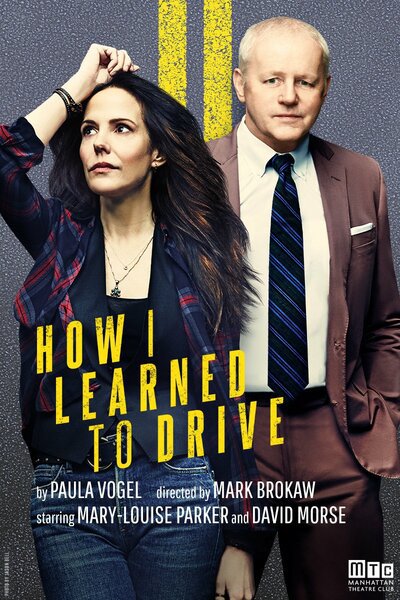
About the Show
Production Covid-19 Safety ProtocolsCritic Reviews (23)
"Vogel’s script creates its own piercing language for assault, harassment and all the ways our society reinforces regressive ideas about gender, sex and consent. The play is structured as an intimate collection of memories roughly organized around a set of rules about the basics of driving, as if someone had sneaked in a series of watercolor portraits between the pages of a driver’s manual. So the warnings about idling and using the reverse gear, which function as clever subtitles announcing the scenes, become subtly tied to the ways Li’l Bit fits those years of assault into her memory."
Read more
"How does one stage a traumatizing play that focuses on grooming, pedophilia, misogyny, and incest? In the case of Paula Vogel's Pulitzer Prize-winning play 'How I Learned to Drive,' which just premiered on Broadway at the Samuel J. Friedman Theatre, Mark Brokaw has opted to direct the most painful moments with a 'folks say the wackiest things' shrug. "
Read more
"Most good theater lives on, if it’s lucky, only in the memory of those who saw it. Manhattan Theatre Club’s revival of Paula Vogel’s 'How I Learned to Drive,' one of the signal plays of the 1990s, represents an exception. With a firm eye on the rearview mirror, this production reunites director Mark Brokaw, who helmed the show’s premiere at the Vineyard in 1997, with its two exceptional original stars, Mary-Louise Parker and David Morse"
Read more
"Twenty-five years ago, Mary-Louise Parker played Li’l Bit, David Morse played Uncle Peck, and Mark Brokaw directed. Now all three are back for Broadway. Strange things happen when nostalgia gets wrapped up in the production, which is itself a cautionary tale about letting atmosphere (the night, the heat, the past) drug the senses. 'Drive' moves backward in time, revisiting earlier and earlier encounters: What we can just bear to look at when Li’l Bit is 17 gets more awful as she becomes 15, then 13, then 11."
Read more
"'How I Learned To Drive,' opening tonight in a first-rate Manhattan Theatre Club production at the Samuel J. Friedman Theatre, stars Parker as a woman looking back on, and struggling to make sense of, her relationship with her abusive Uncle Peck (Morse)."
Read more
"It’s an unsettling experience, of course, now produced at an unsettling moment when most of our attention has been placed elsewhere. As such, it dislocates and worries in a way that I don’t think was true in 1997. You deserve to be appraised of that. As we all know, the world only spins forward and yet the habits and predilections of some always seem to find a way to adapt."
Read more
"Vogel is a genuine wordsmith, and her language here is almost indecently seductive. A list of hard liquor drinks — luscious Pink Ladies, sloe gin fizzes, daiquiris — has the same lilting cadences as a description of a warm summer night under the stars. "
Read more
"Yes, the shiny, stylish model handles great on today’s theatrical highways and bumpy back roads of the Discourse. If anything, it might be too sophisticated a ride for new drivers. Why isn’t Peck’s downfall more satisfying? Why don’t we see Li’l Bit happy and successful later in life? Why does empowerment feel so melancholy? We can ask these questions all day; Paula Vogel will still be up front, eyes smiling in the rearview mirror."
Read more





